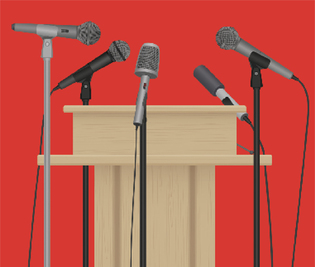
Istock
Since the Hamas attack on Israel in October 2023, more than 20 universities have adopted new postions regarding official statements by their leaders about external issues. Many of them have said they will refrain from taking official positions on issues unless they pertain to the institution’s core mission, a position some call institutional neutrality. Now, a faculty committee appointed by President Maurie McInnis ’96PhD has weighed in with recommendations for Yale leaders.
The recommendations of the Committee on Institutional Voice, issued in late October and accepted by McInnis, begin with the presumption that “university leaders should refrain from issuing statements concerning matters of public, social, or political significance, except in rare cases.” But committee cochair and philosophy professor Michael Della Rocca says that’s not the same thing as institutional neutrality. “When leaders make the decision not to speak out on a given issue,” he says, “that should not be seen as a profession of neutrality but rather, as a decision that’s made in the service of the university’s mission.”
The recommendations also differ from the approaches of other universities in that they don’t articulate a policy to be implemented by the administration but give leaders principles with which to “exercise their best institutional judgment when determining whether, when, and how to speak.” Law School professor Cristina Rodríguez ’95, ’00JD, the committee’s other cochair, says the recommendations are “meant to guide judgment; they are not meant to create rules that people could end up breaking if they don’t interpret them correctly.”
The other two presumptions in the committee’s report describe when it might be appropriate to speak out. One case is “when events of public, social, or political significance directly implicate the university’s core mission, values, functions, or interests.” Those values, the report continues, include the free exchange of ideas, the dissemination of knowledge, and educating future citizens and leaders.
Another case is making “statements of empathy or concern in response to events outside the university” when those events are “of transcendent importance to the community.” Rodríguez says this presumption is intended to cover events that affect significant numbers of people in the community. “I think the best example is 9/11, where people in the community were affected in a wide range of ways,” she says. In such instances, the report advises, administrators should “avoid expressing partisan political opinions when speaking from their institutional roles.”
The report also gives several reasons for the presumptions, among them the idea that public statements by university leaders may make those with opposing views feel marginalized. The committee also wrote that “the frequent issuing of statements by leaders of the university runs contrary to the deliberative process inherent in study, research, and the production of knowledge.”
Appointed in September, the seven-person committee held ten listening sessions for students, staff, and faculty and solicited comments via a webform that attracted more than 200 responses. McInnis released the committee’s report along with a statement that she has accepted it “because I believe its recommendations will strengthen Yale’s ability to uphold and defend academic freedom and the academic enterprise.”
In November, former president Peter Salovey ’86PhD published an opinion essay at Elsevier.com taking issue with university statements of neutrality. He didn’t address the Yale committee’s recommendations specifically, but he expressed his belief that “the philosophical case for institutional neutrality is overdone,” and his concern that “not speaking on contemporary world affairs is an abdication of leadership responsibilities.” Della Rocca says Salovey also shared these opinions with the committee.
Among Yale’s peers, Harvard and Stanford have both adopted policies in the past year discouraging official statements on external issues. Princeton president Christopher Eisgruber told the Daily Princetonian in September that the administration had no plans to consider institutional neutrality, but that it would continue its current policy of “institutional restraint.”
 loading
loading